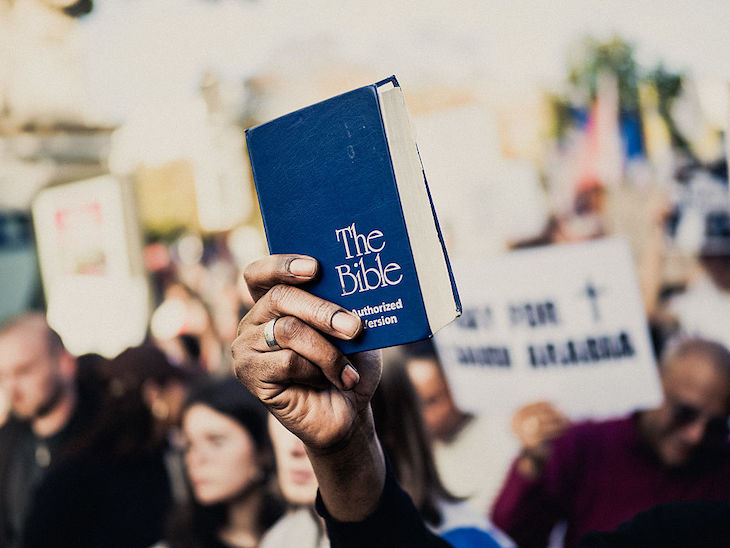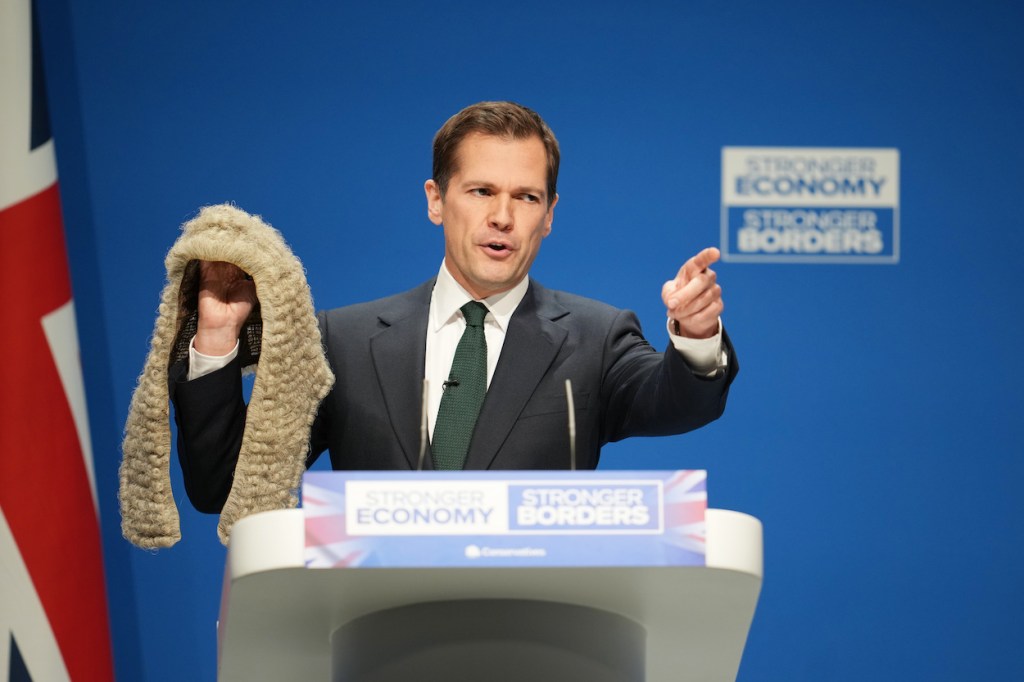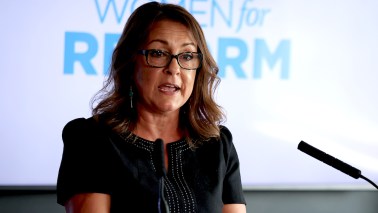You have probably heard that something extraordinary is happening in the Catholic Church in France. The French bishops’ conference announced in April that more than 10,000 adults were due to be baptised in 2025 – a 45 per cent increase on the year before.
France is seeing what the media call a ‘boom biblique’: a rapid rise in sales of the Bible
It’s not just adult baptisms that are booming. A record 19,000 people, many young, attended this year’s Paris to Chartres pilgrimage. An unprecedented 13,500 high school students took part in the 2025 Lourdes FRAT pilgrimage, a major annual youth event.
The country is also seeing what French media call a ‘boom biblique’: a rapid rise in sales of the Bible. Religious bookstores report a 20 per cent increase in purchases since 2024.
It’s easy to state these facts. But it’s harder to discern their cause. Why are young people flocking to the Catholic Church more than 200 years after it was violently ejected from the public square during the French Revolution?
News reports – both in France and the English-speaking world – have only scratched the surface of the phenomenon. But the most in-depth investigation to date has just been published in France. It’s called Enquête sur ces jeunes qui veulent devenir chrétiens (Inquiry into Why Young People Want to Become Christians) and the author is Antoine Pasquier, a journalist at the French Catholic weekly Famille Chrétienne.
Pasquier explores what young French adults seeking baptism as catechumens say about themselves. He mixes their observations with his own insights as a catechist who saw the wave arrive in his parish and watched as it took on breathtaking proportions. The dynamics he uncovers are unexpected.
For example, through his interviews with catechumens, Pasquier finds that reading the Bible plays a more fundamental role in conversions than the internet and social media. Also, many young seekers arrive at church with an idea of religion shaped not by Christianity but by Islam.
The book, currently available only in French, offers guidance to Church leaders as they grapple with this unforeseen influx. Pasquier calls for a deep transformation of French Catholicism, from a community resigned to decline to a ‘catechumenal Church’. He sees signs that this shift may be beginning.
Pasquier spent ten years as a reporter for a French regional weekly newspaper before joining Famille Chrétienne in 2013. He has coordinated the Catholic magazine’s investigations into topics such as the abuse crisis. He is married, with four children, and has accompanied young catechumens at his church in the Paris region since 2020.
In an interview with the Pillar, he discussed the genesis of his book, what surprised him about the catechumens, and the French Church’s lessons for Catholics elsewhere.
Catholics around the world are fascinated by what’s occurring in France. How would you explain briefly what’s happening to someone living outside of France?
Since 2020, France has seen a significant influx of catechumens from all ages and social backgrounds. The figures speak for themselves: in 2025, the number of adults seeking baptism is the highest ever recorded since the French bishops’ conference began tracking catechumens in 2002. For the first time, the symbolic threshold of 10,000 adult baptisms has been surpassed.
Over two years, the growth is remarkable: 5,463 baptisms in 2023, 7,135 in 2024 (+30.6 per cent), and 10,384 in 2025 (+45.5 per cent). In other words, the number of adult baptisms nearly doubled between 2023 and 2025 (+90 per cent).
Among these 10,384 newly baptised adults, the 18 to 25 age group now represents the largest share, with approximately 4,360 catechumens (42 per cent). Adolescent baptisms (ages 11-17) also show strong growth. In 2025, there were 7,404, compared to 1,547 in 2022 (+76 per cent). In just three years, the numbers have multiplied nearly fivefold.
Paradoxically, this phenomenon occurs in an ecclesial context marked by the sexual abuse crisis and a decline in vocations. This completely unexpected influx has caught parishes off guard, forcing them to adapt quickly. Initially taken aback, French Catholics are now seeking the best ways to welcome and support these seekers of God.
Is your book the first in-depth exploration of why so many young people are becoming Catholics in France?
Until now, this phenomenon has only been analysed by media outlets, whether Catholic or secular. Drawing on the statistics published and interpreted annually by the French bishops’ conference, these media have attempted to explain the reasons behind this influx of catechumens. Numerous testimonies have also been published.
As a journalist for Famille Chrétienne magazine, I began working on this topic three years ago. However, my book is the first comprehensive investigation that seeks to deeply analyse the reasons why these young people are choosing to become Christians.
I deliberately focused on the 15-25 age group, first, because it is the best represented demographic (45 per cent of French catechumens in 2025, or more than 8,000 young people), and second because their pathway differs from that of older adults.
When did you first become aware of this phenomenon?
Since 2020, I have been accompanying high school students preparing for baptism in my parish in the Paris region. As a catechist, I’ve seen a growing number of young people in my group who are seeking God and eager to become Christians.
They often came in groups, frequently with friends. We also began noticing them more often and in greater numbers at Sunday Masses, approaching during Communion with their arms crossed to receive the priest’s blessing.
This personal observation was echoed by other catechists in different parishes and towns. After doing some research, this time as a journalist, it quickly became clear to me that this phenomenon was nationwide and completely unprecedented.
Many reports stress the role of the internet in the new wave of conversions. But you’ve discovered that the Bible plays an even more important role. Can you explain why this is the case?
Gen Z is raised on social media. Influencers on these platforms share increasingly specific and well-crafted content, created by Christian influencers, which provide answers to their existential and spiritual questions.
But these networks are not the place of their conversion. The conversion happens earlier, in a natural way, I would say. Social media and the internet complement and support their conversion.
The Bible, on the other hand, plays a role much earlier in their journey. Once they decide to deepen their spiritual search within the Christian faith, the Bible becomes essential for them. Almost all the young people I accompany or have interviewed tell me they bought, opened, and read the Bible before taking any official steps with the Church.
Alongside the church and Mass, the Bible is a reliable and easily identifiable reference point for them. They think, ‘I want to be Christian, how do I do it?’ And the answer is obvious to them: ‘I need to read the Bible and go to Mass.’ The strong growth in Bible sales, both in France and abroad, reflects this new enthusiasm.
You note that many young French people who approach the Catholic Church come with an idea of religion that’s shaped by Islam, with its stress on fasting practices, etc. Why is that, and what challenges does it bring?
It’s primarily the public and overt expression of Islam that challenges them. Some of their Muslim friends openly embrace their faith and religious identity without reservation. This prompts our young people to also make their growing Christian faith visible. This is expressed through wearing a cross necklace, sometimes a chapel veil for young women, or by observing the practices of various liturgical seasons, particularly Lent.
Lent, with its radicalism, attracts these young people searching for guidance and meaning. They sometimes tend to view this period as a ‘Christian Ramadan.’ Catechists must take care to explain the differences clearly and remind them that Christianity is not primarily a religion of observance but of personal and inner conversion.
What surprised you most about the young people becoming Catholic?
Their determination and patience. Some have been on a journey for years, hidden from view, out of fear of being misunderstood by friends or family.
I think of a young woman who waited nine years between her first time entering a church and her official request for baptism. Another took three years between her first reading of the Gospel, alone in her room, and attending her first Mass with a friend. Their faith is already so strong that they are not afraid to wait this long to receive baptism.
You call for the French Church to be transformed into a “catechumenal Church.” What would this look like?
The early Church, the Apostolic Church, was by its very nature a catechumenal Church. When the Apostles and the Virgin Mary received the Holy Spirit on the day of Pentecost, they immediately left the Upper Room to proclaim the Good News of Christ and performed the first baptisms (Acts 2:41).
In the early communities, Christians – who were therefore neophytes — listened to the teachings of the Apostles. This teaching was centred on proclaiming the kerygma, the core of the Christian faith. These communities were also attentive to each other’s salvation and to the work of the Holy Spirit among them.
A catechumenal Church is a Church attentive to proclaiming the kerygma, to the salvation of each and every person, and listening to the Holy Spirit. These dispositions will help our Church today to be ever more attractive and open to those who seek God.
Is there anything that other countries that are also seeing a boom in adult baptisms could learn from the Church in France?
The Church in France is gradually coming to terms with what is happening. I’m not sure it has many lessons to teach other Churches.
The first to understand what was happening were the catechists, those closest to the grassroots. They reacted quickly and took steps to address this unexpected wave. If there is a lesson to draw from France, it is this adaptability on the ground.
The Church must be careful not to remain trapped in old patterns or reflexes. The mindset of ‘We’ve always done it this way!’ is no longer viable. Without losing its essence, the Church must adapt to these new Christians, responding to their questions, expectations, and thirst.
Pope Leo XIV himself says it well: ‘The crisis of faith and its transmission, together with the hardships related to ecclesial belonging and practice, invite us to rediscover the passion and courage for a new proclamation of the Gospel. At the same time, various people who seem to be distant from the faith often return to knock on the doors of the Church, or open themselves to a new search for spirituality, which at times does not find adequate language and forms in the usual pastoral offerings.’
This article was originally published in the Pillar







Comments